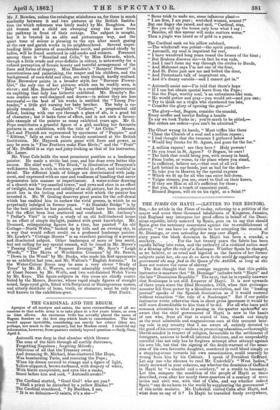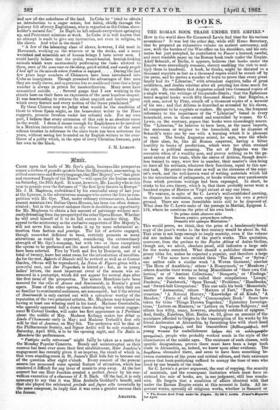THE TIMES ON HAYTI :—(LETTER TO THE EDITOR).
Sra,—An article in the Times of to-day, referring to a petition of the mayor and some three thousand inhabitants of Kingston, Jamaica, that England may interpose her good offices in behalf of the Domi- nican republic, lately annexed by Spain, goes on to say that should Spain give the necessary assurances against the re-establishment of slavery, "we can have no objection to her accepting the cession of St. Domingo, or even extending her sway over Hayti. . . . For sixty years the black dominion in Hayti has been a scandal, a mockery. . . . For the last twenty years the fabric has been rapidly falling into ruins, and the authority of a civilized nation must be a blessing after the rule of a Soulouque. Whether Spain be changed, as we believe, or as cruel and bigoted as the fancies of her former subjects paint her, she can do no harm to the world ky supplanting any government she may find in the Queen of the Antilles, as long as she does not restore the curse of slavery?' The first thought that the passage suggests is, that this public instructor is unaware that "St. Domingo" includes both "Hayti" and the late "Dominican Republic." The next, that he is equally unaware that Soulowine is not still Emperor of Hayti. It is now upwards of three years since the 22nd December, 1858, when that grotesque monster fell from power by a bloodless revolution, and the " leading journal" speaks of the Spanish domination as if it would succeed without transition "the rule of a Soulouque." But if our public instructor wrote otherwise than in sheer gross ignorance it would be still more discreditable to him than if he did. For all who have paid common attention to what is passing in the quarter spokeneof are aware that the chief government of Hayti is now in the hands of one who, from all that is stated of him, stands out simply as the most admirable and magnanimous man at this moment bear- ing rule in any country that I am aware of, entirely devoted to the good of his country— zealous in promoting education,—thoroughly liberal-minded in respect of religion, favourable to the settlement of foreigners, anxious to hed-all internal divisions, and so unspeakably merciful that not only has he forgiven attempt after attempt against his own life, but that the signing of the death-warrant of the assas- sins of his own favourite daughter, murdered in cold blood simply as a stepping-stone towards his own assassination, could scarcely be wrung from him by his Cabinet. I speak of President Geffrard. Let any one who chooses to read Mr. Underhill's "West Indies," lately reviewed in your columns, say whether the dominion of Geffrard in Hayti be "a scandal and a mockery'," or a credit to humanity. Let him compare the condition of the people of Hayti as there described, even after her nearly three-quarters of a century of revo- lution and civil war, with that of Cuba, and say whether indeed Spain "can do no harm to the world by supplanting the government" of this noble mulatto. Mr. Underhill visited Cuba after Hayti, and what does he say of it ? In Hayti he travelled freely everywhere,
lid saw all the nakedneas of the land. InCuba he "tried to obtain an introduction to a sugar estate, but failed, chiefly through the jealousy felt of every Englishman, who is regarded as the Cuban slave- holder's natural foe." in Hayti he left schools everywhere springing up, and Protestant missions at work. In Cuba it is well known that no attempt is made to give any instruction, not even in religion, to the slaves. And what M the result?
"A few of the labouring class of slaves, however, I did meet in Havannah, working on the wharves or in the docks, and a more wretched and miserable set of human beings I have never seen. I could hardly believe that the stolid, round-headed, brutish-looking animals which were mechanically performing the tasks allotted to them, were of the same race as the sharp, quick-willed, and manly people I had left in theislands where freedom is enjoyed.. . . During-the last few years lame numbers of Chinareeu have been introduced into Cuba as immigrants. Though promised the advantages of free men they are really slaves, and oppression has so maddened them that a large number is always in prison for insubordination. Many more have committed suicide. . . . Several gangs that I saw working in the streets bore on their faces an expression of the roost hopeless despair. It was heartrending to witness the silent anguish and tearless agony which every feature and every motion of the frame proclaimed.' By these Chinese may we judge what would be the condition of those to whom Spain might, as the benevolent writer in the Times suggests, promise freedom under her colonial rule. For my own part, I believe that every extension of that rule is an absolute curse to the world. I deem it shame enough for Englishmen to be involved in a Mexican intervention with an ally whose violation of the most solemn treaties in reference to the slave trade has been notorious for years, without seeing her hounded on by English writers to the over- throw of a polity which, in the eyes of every Christian freeman, puts her own to the blush. J. M. LUDLOW.































 Previous page
Previous page